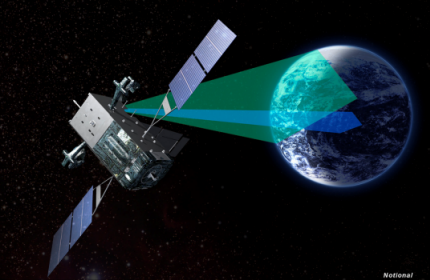Air Force awards $1.86B contract for next two SBIRS satellites
Lockheed Martin gets the go-ahead to finish the fifth and sixth satellites in the early missile warning and infrared surveillance system.

The Air Force has awarded Lockheed Martin a $1.86 billion contract to finish production of the fifth and sixth satellites for the Space Based Infrared System, which provides ballistic missile early warning and infrared surveillance to decision-makers from the president and Defense secretary to combatant commanders and the intelligence community.
The geosynchronous earth orbit (GEO) satellites, GEO-5 and GEO-6, will join a SBRIS architecture that also includes two hosted payloads in highly elliptical orbit (HEO), and ground hardware and software, Lockheed said in an announcement.
The first satellite, GEO-1, was launched in 2011 and GEO-2 went into orbit in 2013. Lockheed currently is conducting acoustic and thermal vacuum testing on GEO-3, which is scheduled for delivery at the end of this year. GEO-4 recently entered final assembly, integration and testing, Lockheed said. GEO-5 and GEO-6 would complete the constellation.
For the fifth and sixth satellites, the Air Force awarded Lockheed initial funding of $82 million in 2012, and a $284.4 million advanced procurement contract in 2013.
“SBIRS provides capabilities critical to our nation’s defense but we also understand in today’s environment that we need to find that perfect balance between capability and affordability,” Jeffrey Smith, vice president of Lockheed Martin’s Overhead Persistent Infrared mission area, said in a statement. “This contract is the third part of a thoughtful acquisition strategy aimed at further reducing cost and cycle time for GEO-5 and GEO-6, while still providing exceptional data to the warfighter.”
The SBRIS program, seen as a critical component of the nation’s future missile defense program, has suffered from significant delays and cost overruns since its early days. Technical shortcomings delayed the launch of the first GEO satellite, originally intended for 2002, and a Government Accountability Office report last year said the program’s budget had ballooned over time from $4.7 billion to $18.9 billion.
In March 2010, following a GAO report on cost overruns and technical failures in Defense Department space programs, however, then-Sen. Ben Nelson told a Senate subcommittee he chaired that DOD was making improvements.
Noting the successful launch the previous year of the military’s third Wideband Global SatCom (WGS) satellite, Nelson said that, “after years of discussing broken space acquisition programs that were years behind schedule and significantly over budget, it appears as if these programs have finally turned a corner.”
The SBIRS team is led by the Infrared Space Systems Directorate at the Air Force Space and Missile Systems Center. Lockheed Martin is the prime contractor, with Northrop Grumman as the payload integrator. Air Force Space Command operates the system.
NEXT STORY: Navy wants to take big data into battle



